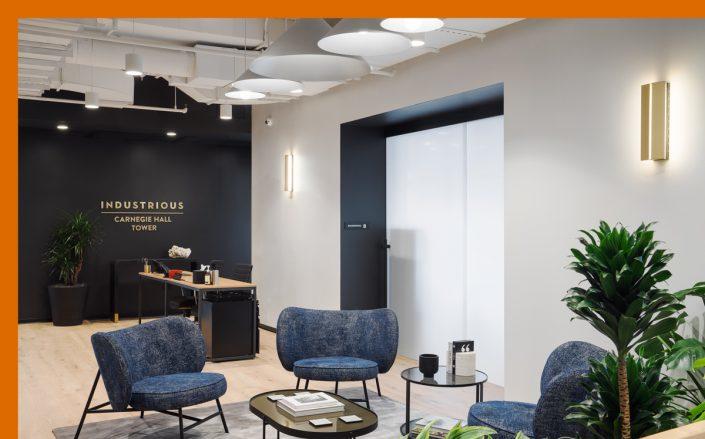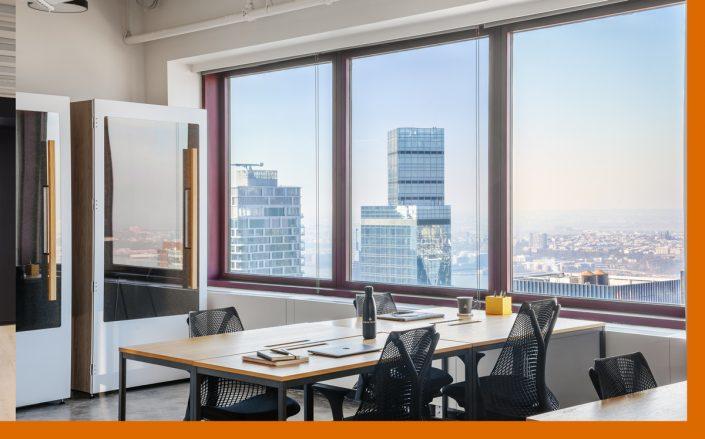Flex-office provider Industrious is doubling down on New York at a time when the future of the office market — and flex offices in particular — is facing unprecedented uncertainty.
The company recently opened a 17,000-square-foot site in Midtown’s Carnegie Hall Tower, the third location it’s launched in the city since the pandemic took hold.

Industrious’ Carnegie Hall Tower space (Photo via Industrious)
In March, it plans to open a 53,000-square-foot location at the Sioni Group’s 44 West 37th Street, and a 60,000-square-foot site at George Comfort & Sons’ 135 W 50th Street. By the end of this year, at least part of a planned 100,000-square-foot site at Vornado Realty Trust’s One Penn Plaza is expected to open. The new additions will make New York the company’s largest market, with 580,000 square feet.
In all, Industrious operates over 100 locations with more than 3 million square feet, and it’s set to grow even further in 2021. The company will expand by 1 million square feet this year, company spokesperson Corey Chambliss confirmed. And that could include moving into spaces abandoned by other flex-office providers.
Many of those competitors are facing their own issues. Regus and Knotel both recently filed for bankruptcy, with the latter set to be acquired by Newmark Group. WeWork is “rightsizing” its footprint as it looks to achieve profitability. And Breather’s CEO, Bryan Murphy, said that company’s business model “doesn’t make sense” after closing all of its locations last year.
Traditional offices, meanwhile, remain mostly empty as the pandemic drags on. As of Jan. 27, offices in the top 10 metro markets are 24.2 percent occupied on average, according to Kastle Systems, which manages security access for office buildings. The figure is even lower in New York City, at 14.4 percent.
Read more



According to Industrious executives, its unconventional business strategy — entering into agreements with landlords rather than signing traditional leases — helped it weather the storm.
“We partner with landlords on these spaces, so there’s not a high fixed rent component,” explained Doug Feinberg, the company’s director of real estate. “When you’re in a downturn or you’re in a pandemic, your unit might not be performing as well, but in our case, we share on the upside, and we share on the downside.”
With traditional leases, flex-office providers are on the hook for fixed long-term costs, while having “highly variable and short-term” income streams, said Scott Homa, JLL’s director of U.S. office research.
But Industrious’ agreements are akin to those between hotel operators and the owners of their buildings. Industrious gets paid a management fee as well as a share of the profits from its spaces based on their performance. The sharing formula varies on a case by case basis, according to Feinberg.
The collaborative business model has been “extremely helpful” during the pandemic, not only because of the risk-sharing aspect, but because it allows Industrious and landlords to work together to navigate the complexities of operating offices during the health crisis, said Jamie Hodari, the company’s CEO and co-founder.
Brooklyn-based developer LIVWRK is one landlord who saw the value in these agreements.
After coworking company Ignitia went out of business last summer, the landlord partnered with Industrious, which took over a 20,000-square-foot space at 1000 Dean Street.

Industrious’ Carnegie Hall Tower space (Photo via Industrious)
Historically, landlords have preferred long-term leases with regular rent payments that typically go up 2 to 3 percent a year, said Matt Ciccotti, LIVWRK’s executive vice president, which allows a building to have a predictable income.
But what people want from offices is changing rapidly — and increasingly for tenants, that’s flexible options.
“From a landlord perspective, it’s all about striking the right balance between retaining the investment value of the building and offering our tenants what they want,” said Ciccotti. He declined to elaborate on the terms of the deal with Industrious.
The company’s partnerships go even deeper with some landlords, including TF Cornerstone, the owner of Carnegie Hall Tower. That company was among the investors for Industrious’ $80 million Series D funding round that closed in August 2019, along with Brookfield and Granite Properties. (TF Cornerstone declined to be interviewed.)
Still, Industrious hasn’t emerged from the pandemic totally unscathed. In April, the company laid off about 20 percent of its workforce and furloughed 10 percent more. Industrious officials said those furloughed workers have been brought back.
Meanwhile, Stockbridge Capital Group, a Chicago landlord, sued Industrious in September, claiming that the flex-office provider shut down its space at 600 West Jackson Boulevard before the lease’s expiration. According to the complaint, Industrious told the landlord that a special-purpose entity named in the lease is responsible for the remaining rent.
Chambliss declined to comment on the specifics of the lawsuit, but told The Real Deal that the location “was a legacy leased unit that came to us via an acquisition and as such, we made the difficult decision to shut it down.” Industrious took over the space in 2018 when it acquired Assemble, a coworking provider that initially signed the lease in 2014.
Despite those setbacks, the firm is confident that it can keep its momentum going, and is even exploring the option of going public later this year or early next.
“We’re putting the supply out because we’re seeing so much demand from small businesses and large enterprise users alike,” Feinberg said recently. “A lot of these companies are no longer signing traditional 10- to 15-year leases. They’re looking at flex operators like Industrious for their real estate needs.”
That includes Ryan Stroker, who set up his startup, single-family rental platform Avenue One, at Industrious’ Hudson Yards location last year. Out of Avenue One’s 25 employees nationwide, eight people are based in the Industrious site and use a 400-square-foot office as they please. Stroker works out of a private office at the site about four days a week.
Compared to WeWork, which Stroker also looked into, Industrious costs slightly more — starting about $300 per person, per month for the Hudson Yards location — but he’s happy to have his own suite overlooking the Hudson River, Stroker said. The membership also includes perks like conference rooms and phone booths.
“As long as Industrious works, it’s a pretty excellent setup,” he said.
